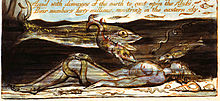Ichthyomancy


The Ichthyomantie is a fortune-telling with the help of dead and live fish and fish viscera. This term refers to methods of predicting from the interpretation of the behavior of fish, their exterior or interior.
Development of Ichthyomancy
Due to its "invisible" way of life under water, the fish offered itself as a special object for the interpretation and research of the future, from which an independent mantic developed. While watching fish jumping and splashing, people on the seashore believed that a storm was brewing or that a family member would die in the near future. In ancient times there is a record of the sacred fish at Myra , the priests constantly fed the fish and these came to the surface of the water when they were called. "But if they throw the meat with their tails on the ground, as if they spurned it and declared it unclean, then one believes that this is the wrath of God ..." Polycharmes reports this kind of ichthyomania in the Lyciacis in Athenaus and Artemidorus . Plutarch and Aelian reported further incidents .
“For example, when a herring with strange characters was caught on the Norwegian coast in 1587 , a flood of writings was devoted to exploring the pre-interpretation of this miracle . Generally one believed in a warning from God , others later took it as the announcement of the death of Frederick II or the fall of the Spanish Armada , others referred to the cessation of the flourishing herring fishery ”. The preacher Bartholomäus Anhorn the Elder (1566–1642) is said to have reported about it from hearsay or from his own practice.
Later in the 19th century one read the future from the bowels of a particular species of fish . But the fish was not only used for fortune-telling, it was also examined for the weather forecast , according to an old fisherman's rule: “Is the pike liver, the bile too broad / pointed at the front. Hard winter takes hold for a long time ”.
literature
- Ulrike Müller-Kaspar (Ed.): The great manual of superstition. From A to cypress. Tosa published by Ueberreuter Verlag , Vienna 2007.
Individual evidence
- ↑ Greek : Ichthyo; German : fish; Greek : manteía; German : Prophecy [1]
- ^ Claudius Aelianus Werke , Volume 2, Klaudios Ailianos, Verlag JL Metzler, 1839, original from the Austrian National Library; Digitized March 6, 2012 [2]
- ↑ Eduard Hoffman-Krayer (Hrsg.): Hieb- und stichfest - crackling - hand dictionaries for German folklore. P. 638/39, Verlag Walter de Gruyter, 1974, ISBN 3-11-084008-1 [3]
- ↑ ibid.
